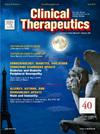The Role of Oral β-Blockers in Patients With Acute Myocardial Infarction with Preserved or Mildly Reduced Left Ventricular Systolic Function: A Systematic Review and Meta-Analysis
IF 3.6
4区 医学
Q2 PHARMACOLOGY & PHARMACY
引用次数: 0
Abstract
Purpose
In patients with acute myocardial infarction (AMI) and preserved or mildly reduced left ventricular ejection fraction (LVEF), there is clinical uncertainty about the effectiveness of β-blockers in reducing mortality. We therefore investigated the effect of oral β-blockers on clinical benefit in patients with AMI with preserved or mildly reduced LVEF.
Methods
We conducted a comprehensive systematic search using PubMed, Embase, Cochrane Library, and ClinicalTrials.gov from January 1, 2000 to May 1, 2025, and finally included 16 observational studies and 2 randomized controlled trials (RCTs) to assess the β-blockers on patients with AMI with preserved or mildly reduced LVEF. The primary outcome was all-cause death, and the secondary outcomes were cardiac death, major adverse cardiovascular events, recurrent MI, hospitalization for heart failure, and stroke.
Findings
According to the search strategy, we finally included 18 studies, of which 16 were observational studies and 2 were RCTs. In the 5 studies without propensity score matching data, all-cause death was significantly lower in the β-blocker group than in the no β-blocker group (odds ratio [OR]: 0.65; 95% CI, 0.53–0.80). In the propensity score-matched 10 observational researches and 2 RCTs, there were no significant differences in all-cause death between the 2 groups. β-Blockers seemed to significantly reduce all-cause death in both non–ST-segment elevation myocardial infarction and ST-segment elevation myocardial infarction (OR = 0.44; 95% CI, 0.24–0.82; OR = 0.62; 95% CI, 0.40–0.98). β-Blockers seemed to be more effective in lowering all-cause death and cardiac death in patients with AMI and an LVEF of 40% to 50% (OR = 0.70; 95% CI, 0.50–0.97), and in the group with a follow-up time of ≥ 3 years, the use of β-blockers was significantly more effective in reducing cardiac death compared with the group with a follow-up time of <3 years (OR = 0.45; 95% CI, 0.23–0.88).
Implications
β-Blockers did not significantly reduce all-cause death and cardiac death in patients with AMI with preserved or mildly reduced LVEF. However, it seemed that patients with an LVEF of 40% to 50% might experience significant benefits in terms of long-term efficacy.
口服β受体阻滞剂在左心室收缩功能保留或轻度降低的急性心肌梗死患者中的作用:一项系统综述和荟萃分析
目的:在急性心肌梗死(AMI)和左心室射血分数(LVEF)保持或轻度降低的患者中,β受体阻滞剂在降低死亡率方面的有效性存在临床不确定性。因此,我们研究了口服β受体阻滞剂对维持或轻度降低LVEF的AMI患者临床获益的影响。方法:从2000年1月1日至2025年5月1日,我们对PubMed、Embase、Cochrane Library和ClinicalTrials.gov进行了全面的系统检索,最终纳入了16项观察性研究和2项随机对照试验(rct),以评估β受体阻滞剂对LVEF保留或轻度降低的AMI患者的作用。主要结局是全因死亡,次要结局是心源性死亡、主要不良心血管事件、复发性心肌梗死、因心力衰竭住院和中风。结果:根据检索策略,我们最终纳入18项研究,其中16项为观察性研究,2项为随机对照试验。在没有倾向评分匹配数据的5项研究中,β受体阻滞剂组的全因死亡率显著低于未使用β受体阻滞剂组(优势比[OR]: 0.65;95% ci, 0.53-0.80)。在倾向评分匹配的10项观察性研究和2项随机对照试验中,两组全因死亡率无显著差异。β受体阻滞剂似乎可以显著降低非st段抬高型心肌梗死和st段抬高型心肌梗死的全因死亡率(OR = 0.44;95% ci, 0.24-0.82;Or = 0.62;95% ci, 0.40-0.98)。β受体阻滞剂似乎更有效地降低AMI和LVEF为40%至50%的患者的全因死亡和心脏死亡(OR = 0.70;95% CI, 0.50-0.97),在随访时间≥3年的组中,β受体阻滞剂的使用在降低心脏死亡方面明显比随访时间为:β受体阻滞剂没有显著降低LVEF保留或轻度降低的AMI患者的全因死亡和心脏死亡。然而,就长期疗效而言,LVEF在40%至50%之间的患者似乎可能会获得显著的益处。
本文章由计算机程序翻译,如有差异,请以英文原文为准。
求助全文
约1分钟内获得全文
求助全文
来源期刊

Clinical therapeutics
医学-药学
CiteScore
6.00
自引率
3.10%
发文量
154
审稿时长
9 weeks
期刊介绍:
Clinical Therapeutics provides peer-reviewed, rapid publication of recent developments in drug and other therapies as well as in diagnostics, pharmacoeconomics, health policy, treatment outcomes, and innovations in drug and biologics research. In addition Clinical Therapeutics features updates on specific topics collated by expert Topic Editors. Clinical Therapeutics is read by a large international audience of scientists and clinicians in a variety of research, academic, and clinical practice settings. Articles are indexed by all major biomedical abstracting databases.
 求助内容:
求助内容: 应助结果提醒方式:
应助结果提醒方式:


